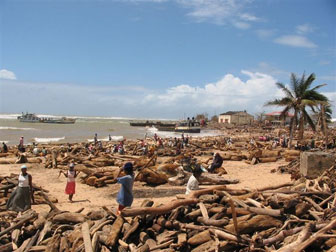Sixth cyclone hits Madagascar; impact “like tsunami”
Sixth cyclone hits Madagascar; impact “like tsunami”
Successive cyclones bring Madagascar to its knees
IRIN
April 3, 2007
JOHANNESBURG, 3 April 2007 (IRIN) – As the sixth mayor cyclone to hit Madagascar this season tears across the northeast of the impoverished Indian ocean island, a relentless succession of natural disasters has left nearly half a million people in desperate need of humanitarian assistance.
|
Tropical cyclone Jaya made landfall on Madagascar’s northeastern coast on Tuesday on a projected trajectory that will see it rage through areas already devastated by cyclone Indlala just over two weeks ago.
“This is the worst cyclone season in the recorded history of the country,” Dusan Zupka, the Senior Emergency Coordination Officer assigned to Madagascar by the United Nations (UN) Office for the Coordination of Humanitarian Affairs (OCHA) in Geneva, told IRIN.
According to the latest UN situation report, almost 130,000 people were “directly affected by cyclone Indlala” and “at least 88 people were killed and 30 disappeared, with about 30,000 left homeless or deprived of all their belongings.”
 Cyclone aftermath in northern Madagascar. © Episcopal relief and development |
Natural disasters have been tormenting the island since the end of last year; Indlala followed in the wake of five destructive cyclones and unprecedented flooding. “Since December 2006, approximately 450,000 people have become the victims of natural disasters all over Madagascar,” said a UN Children’s Fund (UNICEF) statement.
“If we cannot speak of a tsunami here in Madagascar, we can at least say that the affects of the natural disasters are somewhat similar to that in the aftermath of the [2004 Asian] tsunami,” said Bruno Maes, the UNICEF Representative in Madagascar.
“Considering the low level of human development [in Madagascar], the consequences are huge,” Zupka said. Madagascar already faces serious challenges: More than 85 percent of its 19.1 million people live on less than US$2 a day, according to the 2006 United Nations Human Development report, and food insecurity and malnutrition are chronic, particularly in the drought-prone south.
“Due to the flooding, tens of thousands of hectares of rice, the basic food source for the Malagasy, have also been destroyed,” the UNICEF statement said. “With the increased food insecurity and shortage, there is the risk of increased malnutrition.”
Access to affected areas is a major obstacle to the delivery of humanitarian assistance, and although assessments are underway, immediate needs are critical.
Communication infrastructure, roads, schools and health centres have been severely damaged; provision of food, potable water, shelter, medicines, sanitation facilities, dealing with waterborne diseases and finding alternative means of transportation – like helicopters – until roads are fixed, are essential.
Officials have warned that in-country supplies are drained. “We are overstretched in terms of human capacity and financial resources,” Zupka said, adding that international donors had been generous and that “all UN agencies have boosted capacity [in Madagascar].
Some replenishment has already come from the international community: “contributions so far in response to the cyclones/floods amount to Ariary 1.5 billion (US$7.5 million),” the UN report noted.
|
Zupka expressed concern over the lack of international media attention the emergency in Madagascar had received, considering the extent of the multiple disasters and the vulnerability of the island and its people. “It is striking that so little attention is being paid to a crisis that affects so many that are already vulnerable because of poverty,” he commented.
With the cyclone season continuing until the end of April or early May, expectations are that Jaya will not be the last disaster to strike the island.
IRIN: humanitarian news and analysis (irin.org. UN Office for the Coordination of Humanitarian Affairs
Hurricanes hurt conservation efforts in Madagascar
Madagascar needs relief help after deadly cyclones